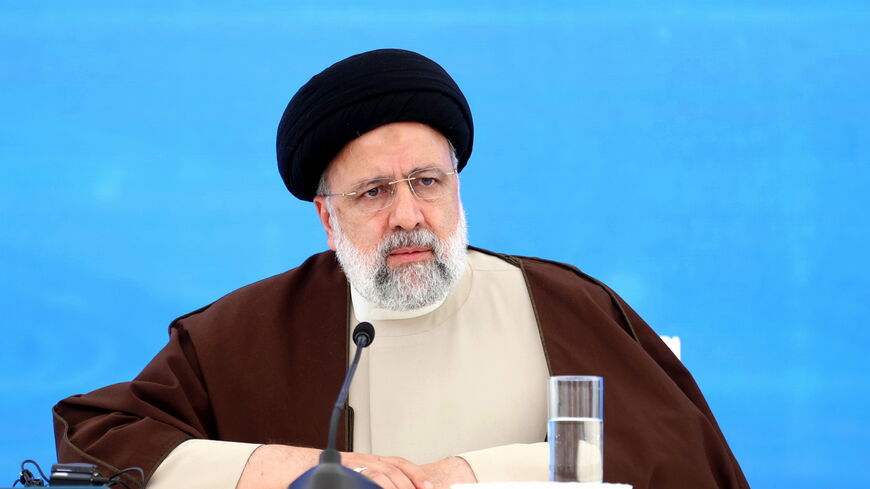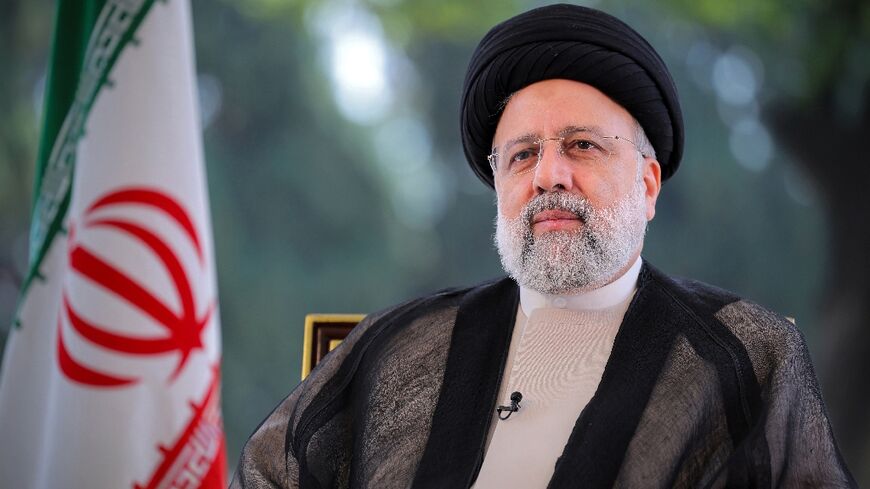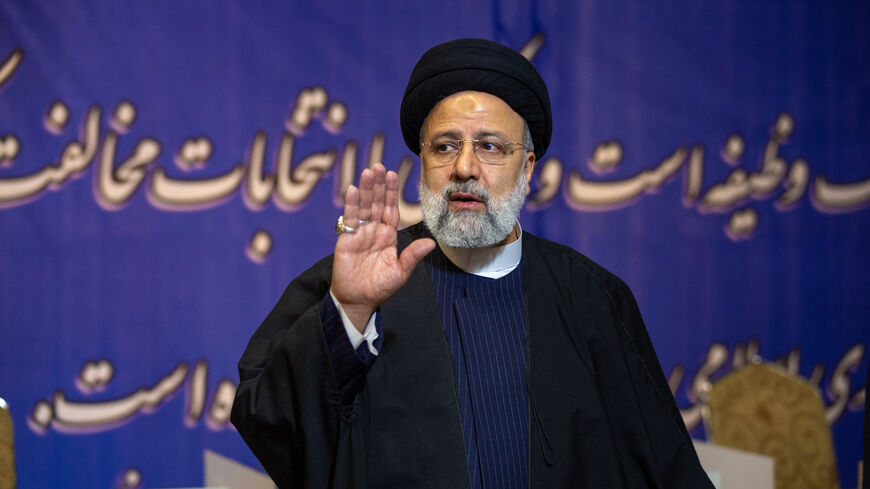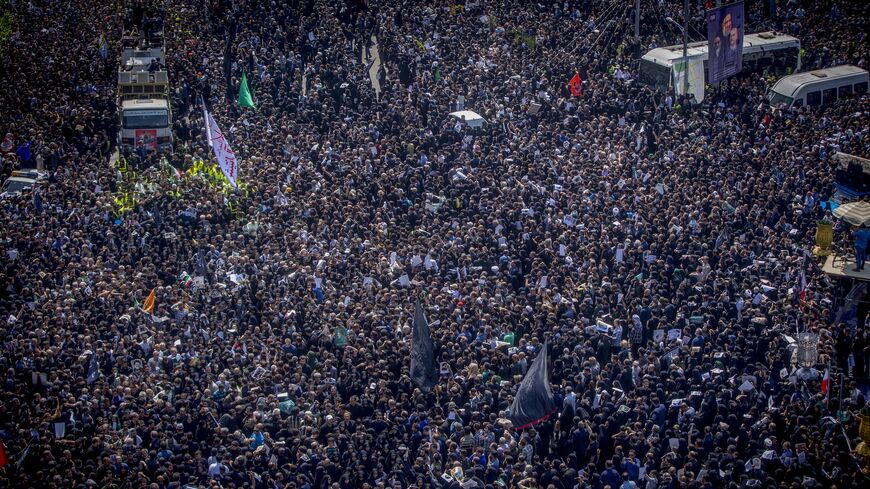From China to Houthis, leaders and groups react to death of Iran's Raisi
Regional and world leaders' condolences have poured in for the death of Iran’s President Ebrahim Raisi and other officials, including the foreign minister, in a helicopter crash.

Following the death of Iran’s President Ebrahim Raisi in a helicopter crash, messages of condolences from world leaders began pouring in on Monday.
Raisi, 63, along with other senior officials including Foreign Minister Hossein Amir-Abdollahian, were returning from the Khoda Afarin region in the northwest after inaugurating a dam at the border with Azerbaijan when their helicopter crashed on Sunday, killing all the passengers, according to Iranian state media.
The helicopter wreckage was found early on Monday in a dense forest after more than 15 hours of search operations hampered by poor weather conditions.
Regional leaders
Turkish President Recep Tayyip Erdogan offered his condolences to Iranian Supreme Leader Ali Khamenei and the Iranian people for the death of Raisi and others who died in the crash.
“As a colleague who personally witnessed his efforts for the peace of the Iranian people and our region during his time in office, I remember Mr. Raisi with respect and gratitude,” he wrote on social media platform X. “We will stand with the Iranian people during this unfortunate time.”
The United Arab Emirates also offered its sympathies to Iran.
“I extend my deepest condolences to the Iranian government and people over the passing of President Ebrahim Raisi, Foreign Minister Hossein Amir-Abdollahian, and those accompanying them following a tragic accident. We pray that God grants them eternal rest and we extend our heartfelt sympathies to their families,” Emirati President Sheikh Mohammed bin Zayed Al Nahyan wrote on X. “The UAE stands in solidarity with Iran at this difficult time.”
Saudi Arabia’s King Salman and Crown Prince Mohammed bin Salman sent separate cables of condolences to Iran’s First Vice President Mohammad Mokhber, who will serve as interim president, according to the state-run Saudi Press Agency.
The Saudi kingdom has long had rocky relations with Iran. In March 2023, the two countries reached a landmark deal mediated by China to normalize their relations after a seven-year rupture.
Qatar's Emir Tamim bin Hamad Al Thani offered “sincere condolences” to the Iranian government and people.
Iraqi Prime Minister Mohammed Shia al-Sudani affirmed in a statement his country’s solidarity with Iran amid what he described as a “painful tragedy.”
Egyptian President Abdel Fattah al-Sisi issued a similar statement, expressing his “deepest condolences and sympathy” to the Iranian people over their “great loss.”
Jordan’s King Abdullah II also conveyed his condolences to Iran. “We stand in solidarity with our brothers in Iran in this difficult circumstance,” he wrote on X.
Palestinian Authority President Mahmoud Abbas issued a similar statement offering his condolences to Iran.
Kuwait’s Emir Sheikh Mishal al-Ahmad al-Sabah and Oman’s Sultan Haitham bin Tariq also conveyed their condolences to Iran in statements.
Syrian President Bashar al-Assad, a staunch ally of Iran, sent a cable offering his “heartfelt condolences” and the Syrian government announced a three-day mourning period in the memory of Raisi.
“President Raisi’s dedication to his career and performance of his responsibilities brought him to East Azerbaijan province to inaugurate a vital project for his country, making him a martyr for the sake of duty,” Assad was cited by the official SANA news agency as saying.
The Syrian leader added that he worked with Raisi “to ensure that the strategic relations between Syria and Iran remains always prosperous.” He recalled the late president’s visit to Syria “as an important milestone” in promoting relations for the benefit of the Syrian and Iranian peoples.
Lebanese caretaker Prime Minister Najib Mikati also declared three days of national mourning for the death of the Iranian president.
The Gulf Cooperation Council issued a statement Monday expressing its “deepest condolences” over the death of Raisi and the other officials. The statement expressed the GCC’s solidarity with the Iranian government “in these difficult circumstances.”
The secretary general of the Organization of Islamic Cooperation, Hussein Taha, also extended his condolences to the Iranian government and people.
Iranian proxies
Iran’s proxies in the region rushed to offer Iran sympathies over the death of its president.
The Palestinian Hamas group conveyed its condolences to and solidarity with the Islamic Republic in this “painful accident.” In a statement, Hamas praised the Iranian leaders who were killed in the helicopter crash for their support of the Palestinian cause and the “legitimate struggle” against the Israeli occupation.
Lebanese Hezbollah issued a long statement mourning the death of Raisi and Amir-Abdollahian.
The heavily armed group praised the late president as a “strong supporter and a staunch defender” of Jerusalem and Palestine and as “a protector of the resistance movements.”
Hezbollah also hailed Amir-Abdollahian as a supporter of the resistance in a statement that concluded by asking God to give the Iranian people the patience and will to overcome “this ordeal.”
Hezbollah has been engaged in heavy cross-border fire with Israel since Hamas’ Oct. 7 assault that prompted the war in Gaza. Iran threw its support behind Hamas and its operation, while its proxies, including the Houthis in Yemen, have been launching attacks against US and Israeli interests in the region in a show of support for the Palestinian group.
Mohammed Ali al-Houthi, the head of the Houthis’ Supreme Revolutionary Committee, expressed his condolences to Iran. In a post on X, he hoped that “the Iranian people will remain adhering to the loyal leaders of their people, by God's will.”
World leaders
Azerbaijani President Ilham Aliyev sent a cable of condolences to Iran’s Khamenei.
“We were greatly shocked by the great loss that befell the friendly and brotherly Republic of Iran and its people,” he said in a statement.
Aliyev had met with Raisi at the border area to inaugurate the dam Sunday, hours before the helicopter crashed upon its return from the area.
Russian President Vladimir Putin recalled Raisi as “a true friend of Russia” who has helped develop the relations between the two countries.
“I had the opportunity to meet Ebrahim Raisi on several occasions, and I will forever have fond memories of this remarkable man,” he said in a message posted on the Kremlin website.
Pakistan also expressed its condolences for the death of Raisi and Amir-Abdollahian.
“Today, Pakistan mourns the loss of a great friend,” Pakistani President Asif Ali Zardari said in a statement released by his office. “Just last month, we had the honor of hosting him in Pakistan. During our discussions, I found him very keen on strengthening our bilateral relations.”
Pakistani Prime Minister Shehbaz Sharif declared a day of mourning in solidarity with the Iranian people.
Raisi had met with his Pakistani counterpart in Islamabad during an April 22 visit aimed at mending ties between the neighboring countries. Tensions had flared earlier this year after Iran’s Islamic Revolutionary Guard Corps struck sites belonging to a Sunni militant group in Pakistan’s Baluchistan province. Two days later, the Pakistani army said it launched precision strikes on bases used by separatist groups inside Iran's Sistan and Baluchistan province.
China's President Xi Jinping joined the other world leaders in extending his condolences to Iran for the death of Raisi.
“His unfortunate death was a huge loss to the Iranian people, and also caused the Chinese people to lose a good friend,” Jinping said in a statement.
European Council President Charles Michel expressed in a brief statement on X the EU’s “sincere condolences” for the death of Raisi and other officials.
Opponents
Israel has yet to officially comment on the news. However, one Israeli official told Reuters on Monday that Israel was not involved in Raisi’s death, saying, “It wasn't us.”
Iran and Israel have been engaged in a shadow war for decades. The tensions threatened to erupt in open confrontation last month after the IRGC launched an unprecedented attack on Israel, firing hundreds of drones in retaliation for a suspected Israeli strike on the Iranian Consulate in Damascus that killed at least seven people, including two IRGC commanders.
Meanwhile, a Paris-based Iranian opposition group described Raisi’s death as a “monumental and irreparable strategic blow” to Khamenei and the Iranian regime.
Maryam Rajavi, the political leader of the People's Mujahedin of Iran (MEK), issued a statement Monday saying that the death of the president “will trigger a series of repercussions and crises within theocratic tyranny, which will spur rebellious youths into action.”
The MEK has been exiled from Iran since the 1980s, after Iranian authorities accused the group of being behind a string of deadly attacks on regime figures during the Iran-Iraq war.







